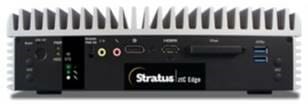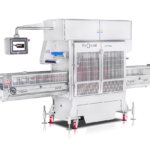Hagihara Industries, whose two pillars of business, both in Japan and overseas, are synthetic resin products and industrial machinery, has moved forward with ICT developments with the aim of improving operational efficiency.
The company is currently replacing its old hardware, on which each of its business systems run. It has virtually integrated its disparate servers to build a new information system infrastructure.
Looking to make use of IoT technology, the company employed Stratus Technologies’ fault-tolerant server, ftServer, in its ICT infrastructure. An information sharing system that helps an innovative manufacturers like Hagihara Industries create comfortable environments with flat yarn.
Hagihara Industries Inc., headquartered in Kurashiki City, Okayama Prefecture, manufactures and sells products that contain the synthetic resin fiber “flat yarn”. They also deal in industrial machinery that employs this technology.
Flat yarn is a strong, flat material created by stretching polyethylene/propylene film slits. This yarn has a wide range of applications and appears in both household and industrial products, such as picnic blankets for fine weather, laminated tarps, artificial turf, construction tarps, and sandbags for landslide prevention.
Since its establishment in 1962, Hagihara Industries has continually pushed for innovation through the use of “cutting, stretching, and winding” technology. It is a leading manufacturer in its industry, with sales exceeding 22.4 billion yen, four production bases in Japan, and group companies in China and Indonesia.
The company has quickly moved forward with ICT developments with the aim of improving operational efficiency. It is also developing business systems that can be used for various operations that extend beyond the scope of the company’s departments.
Mr. Kengo Ito, Assistant Manager of the Information System Division in the Accounting Department of Project Support, says that “the company’s HAGI-Web system is indispensable for the company’s operations. Essentially, it extracts and displays necessary on-site data from the data accumulated in the mission-critical system.”
This HAGI-Web system is an in-house information sharing system that can be viewed in a browser. It employs a BI (Business Intelligence) mechanism that allows each site to visualise necessary information, such as purchases, orders, inventory, production control, sales, utilisation, and profitability.
With this system, on-site managers can easily obtain the information they need for work. It increases the speed at which business is performed and contributes to greater operational efficiency. Mr. Ito continues, “Information accumulated on the mission-critical system is an asset. However, information could not be directly referenced on our company’s system. Therefore, we decided to build a database that regularly extracts and saves data from the mission-critical system. This data can be referenced from the HAGI-Web system.”
However, after seven years of operation, the hardware behind the HAGI-Web system began to show its age. “At first the backup equipment malfunctioned. Maintenance parts couldn’t be obtained, so repairs were impossible. The risks were increasing day-by-day. Server performance was also lacking. It took a while for data to be displayed, and timeouts occurred frequently. As a result, operational efficiency was dropping,” says Mr. Tamotsu Sera, Assistant Manager of the Production Team in the Development Division of the Development Department in Synthetic Resin Operations. The HAGI-Web system urgently needed to be replaced. “We also began noticing shortcomings in all of our resources, with other systems aging and the amount of data from other business systems linked to the HAGI-Web system increasing. We felt that it was necessary to adopt an integrated information system infrastructure with an eye toward the future,” says Mr. Ito.
With the virtual integration of aged servers, hardware reliability and operability became decisive factors. The company immediately began investigating and decided to adopt a virtual infrastructure for its new information system. The existing system was moved over a period of time.
“There were three things we focused on during this transition period. The first was reliability. Our company’s plants run 24 hours a day, 365 days a year. We needed even better reliability for the base hardware on which our multiple business systems were being virtually integrated. The second was support for moving the database. Our company’s HAGI-Web system was developed in-house. The specification and operation manuals that were available when we built our system were insufficient, and knowledge was not being passed down, so we were very uneasy about the idea of a transfer. The third was expense. All expenses related to moving the system needed to be within budget. We asked multiple companies to give us proposals that met these three needs, and Fuji Xerox Okayama gave us one that really stood out,” says Mr. Ito.
The solution – A large step towards IoT
Many of the proposals we received suggested a cluster system. The aim was to combine multiple servers and external disks to ensure redundancy. However, cluster systems involve failover (switching) to the standby system from the actual server when a failure occurs, resulting in system downtime during which work must be suspended. Memory and cache data loss can also occur when switching between machines. Then there are issues with the amount of time needed to rewrite applications, create scripts, and so forth.
On the other hand, Fuji Xerox Okayama’s proposal was for a highly reliable system using Stratus Technologies’ fault-tolerant server, ftServer. All of the components in ftServer, such as the CPU, memory, and power supply, are duplicated, eliminating the possibility of a single point of failure. Since each CPU processes at the same time in sync with the others, any failure that may occur is automatically detected and isolated from the system so that it can keep running without any effect on the OS or applications. The failed component can be replaced without halting the system, thus avoiding time lag and data loss.
Mr. Kazuhiro Sunami, Group Leader of the SE Group in the Solution Sales Department, has the following to say: “Compared to a cluster system, ftServer has an extremely simple configuration. Work can be continued without system interruption when a failure occurs. And since operations take place on a single server, this cuts down on the amount of time spent by the system operations manager. With high availability and no time spent on maintenance, I felt that ftServer would be the optimal server for Hagihara Industries’ new information system infrastructure.”
Mr. Yuji Yamazoe, Assistant Manager of Major Group 2 in the Major Sales Department, continues: “Our company excels at multi-vendor response for everything from the proposal to the construction and support after installation. We assist in the construction of flexible and optimal systems that meet the needs of our clients. Highly reliable and easy to use, ftServer also promotes innovative ways of working, so we felt confident submitting our proposal for an information system infrastructure that would support the future IoT efforts of Hagihara Industries.”
“It was a proposal that gave us peace of mind on all fronts, from ftServer’s high operability and failure-response to its future operational management and maintenance systems. The company’s compact proposal was within budget, and this included support for the database transfer. We felt there was only one choice for us,” says Mr. Sera, reflecting on the company’s decision to select ftServer.
Hagihara Industries received hospitable support from Fuji Xerox Okayama to move forward with the construction of its new information system infrastructure. Microsoft® Hyper-V was used to virtualise and integrate the first three of the company’s systems. “This was our first experience installing Hyper-V, but we had the impression that it was extremely simple and user-friendly. The HAGI-Web system performed even better after everything had been transferred to the ftServer. Now you just click a button and the data is displayed on the screen a second later. This eliminates the timeouts we had been experiencing in the past,” says Mr. Sera on the effects of the installation. ”Our users deeply appreciate the fact that necessary information is smoothly displayed. There is also a lot of peace of mind from an operational management perspective, since the system isn’t interrupted when a failure occurs. We’re free from server management now, and can focus on our actual work. We’re relieved that we can safely transfer the databases used on the HAGI-Web system. We are extremely grateful to Fuji Xerox Okayama. They supported us with everything, including the finer details that we couldn’t handle on our own,” continues Mr. Ito. Hagihara Industries plans to virtually integrate other servers into its information system infrastructure. It will continue to streamline the operation of its entire ICT infrastructure.
The company has also started looking into IoT and big data technology, using its new information system as a base. Discussing the company’s future prosperity, Mr. Sera has the following to say: “Our first goal is to improve the operational efficiency of our production facilities through the accumulation and analysis of big data. We have our sights set on making use of IoT technology throughout the entire manufacturing process. By utilising the large amount of information obtained from IoT technology, not only will productivity and operational efficiency be improved, but we feel that it will also be possible to create unmanned manufacturing processes, thus leading to new service models. Stability is essential for both our machinery and the information system infrastructure that supports our production. Whenever our managers decide to analyse data, they need to access that data in real time. A database interruption means a business interruption. Installing ftServer was an important step for us in our IoT efforts.”
As digital business continues to show more and more promise, data from IoT is becoming an increasingly valuable asset. This highly reliable information system infrastructure supported by ftServer will surely be a powerful tool for advancing the business of Hagihara Industries.





